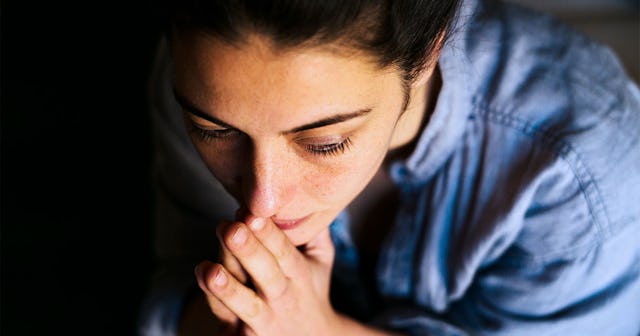The Truth About Life After An Abusive Relationship

It started subtly: A push here, a shove there. It evolved quickly. The second time he hit me was mere months after the first. I had a bloody nose and a black eye. And while I should have recognized the signs of abuse because every sign was there — he was manipulative and controlling, he punched me and put me down — I couldn’t see the train wreck coming. I failed to see the headlights even when they shone directly in my face because I was blinded by them, and him. My vision obscured. My eyes were (quite literally) swollen shut. And they stayed that way for years.
I stayed in an abusive relationship for years.
I wish I could say otherwise. I wish I could tell you I left after he dragged me, half naked and screaming, through a Philadelphia suburb. My hair was in knots. My ass, thighs, and underwear were bloodied and bruised. They grated along the uneven ground. I wish I could tell you I left after we had a drunken tussle over a banana, one which left me with numerous facial injuries. There was a gash on my nose. Bruises covered my cheeks and eyes. And I wish I could tell you I left after he held me (and my head) under 12 inches of standing water. After he strangled and nearly drowned me in the bath, but I didn’t. I stayed.
For years, I stayed.
And while the reasons for staying were numerous — I stayed because I was scared and lonely, because I struggled to let go. I stayed because I believed things could get better. They would get better. I could change him. And I stayed because I was ashamed. I felt like his actions were my fault — the why doesn’t matter. What matters is now, what I do today. And today, I am evolving, growing, loving and thriving, not just surviving. These days I don’t live in fear or crisis management mode.
I wake up without bandages.
There are no broken bones to tend to. No wounds, no scars.
Of course, I’d be lying if I said this change came about quickly. It did not. While walking away from an abusive relationship is an important step, it is the first of many steps one needs to take to heal — and no one tells you that. No one tells you that recovery is hard.
There is pain and sadness, shame and grief. I mourn the loss of the person I was — and the relationship that should have been. This was my friend, after all. My partner, future, present, and past. There is anger. I hate the idea that my abuser still has power over me, or that he ever did. I am disappointed in both him and myself. There is a feeling of failure and frustration. I am furious, and at the same time I feel a sense of defeat. Why? Because after leaving, I was able to see my situation in a new light, and that forced me to acknowledge a difficult “truth:” I stayed. For years, I stayed. I didn’t value myself, or my life. Plus, trauma does things to the body — and the mind — and it took me years to recover.
I am still recovering.
Living through violence puts you on edge. Every time I hear someone yell, I cower. I shiver. I quake. A slammed door or shattered glass can cause me to shut down. Tension in my home causes me to freeze. I do not handle confrontation well. I also struggle with my self-esteem. It’s been seven years since my last attack, and I still struggle with my sense of self-worth.
But I am building myself back up, bit by bit. I see a trauma specialist every week, a mental health professional who helps me reclaim my identity and move beyond my past. I see my psychiatrist once or twice a month, and he has been integral in my recovery. He doesn’t just dole out meds. He gives me support and advice. And I have a few friends which I confide in. I tell them how I’m feeling — and when I’m not okay.
Are things perfect or great? No. Definitely not. I still struggle. Life after abuse is hard. But it’s exponentially better than the alternative. Even with PTSD, I am happier now than I’ve ever been, and that is because I’m free. I’m living life on my terms, and for me.
If you’re experiencing abuse and/or partner violence and need help, call the National Domestic Violence Hotline at 1-800-799-7233 or chat with an advocate on their website. If you are in imminent danger, call 911.
This article was originally published on